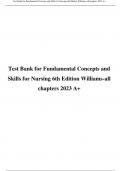Sleep fragmentation - Study guides, Class notes & Summaries
Looking for the best study guides, study notes and summaries about Sleep fragmentation? On this page you'll find 389 study documents about Sleep fragmentation.
All 389 results
Sort by
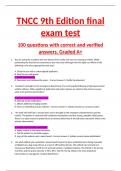 Popular
Popular
-
TNCC 9th Edition final exam test 100 questions with correct and verified answers. Graded A+
- Exam (elaborations) • 16 pages • 2024
-
- $13.99
- 9x sold
- + learn more
TNCC 9th Edition final exam test 100 questions with correct and verified answers. Graded A+ 1. You are caring for a patient who was thrown from a bike and was not wearing a helmet. While performing the head-to-toe assessment, you note clear drainage from the right ear. Which of the following is the most appropriate next step? A. Clean the ear with a cotton-tipped applicator. B. Pack the ear with gauze. C. Notify the physician D. Document and continue the exam. - Correct answer C. Not...
error
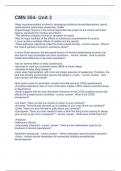
-
CMN 554- Unit 3 Review Test.
- Exam (elaborations) • 21 pages • 2024
- Available in package deal
-
- $11.99
- 2x sold
- + learn more
CMN 554- Unit 3 Review Test. -Major neurotransmitters involved in developing substance abuse/dependence: opioid, catecholamine (particularly dopamine), GABA -Dopaminergic neurons in the ventral tegmental area project to the cortical and limbic regions, especially the nucleus accumbens. -This pathway probably involved in sensation of reward -May be major mediator of the effects of substances (amphetamine & cocaine) -Locus ceruleus mediates effects of opiates and the opioids -These pathways ...
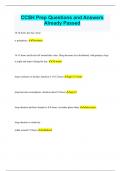
-
CCSH Prep Questions and Answers Already Passed
- Exam (elaborations) • 58 pages • 2024
-
- $12.99
- + learn more
16-18 hours per day; sleep is polyphasic. Newborns 14-15 hours and levels off around that value. Sleep becomes less distributed, with primary sleep at night and nap(s) during the day. 16 weeks sleep continues to decline; duration is 10-12 hours ages 2-5 years sleep becomes monophasic; duration about 10 hours age 10 sleep duration declines sharply to 8-9 hours; circadian phase delay adolescence, sleep duration is relatively stable around 7-8 hours adulthoodsleep time decreases and a bipha...
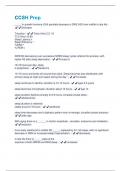
-
CCSH Prep Latest Questions & Answers Verified 100% Correct
- Exam (elaborations) • 24 pages • 2024
- Available in package deal
-
- $8.39
- + learn more
_____ in growth hormone (GH) parallels decrease in SW3 (N3) from midlife to late life. - ️️Decrease Tricyclics - ️️Tmax (Hrs) 2.5 -10 T1/2 (Hrs) 16-80 Sleep Latency v Sleep Efficiency ^ %SWS ^ % REM v SWS/N3 decreasing over successive NREM sleep cycles reflects this process, with higher N3 after sleep deprivation - ️️Process S 16-18 hours per day; sleep is polyphasic. - ️️Newborns 14-15 hours and levels off around that value. Sleep becomes less distributed, with prim...
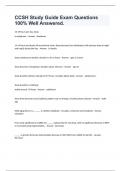
-
CCSH Study Guide Exam Questions 100% Well Answered.
- Exam (elaborations) • 36 pages • 2024
- Available in package deal
-
- $10.09
- + learn more
16-18 hours per day; sleep is polyphasic. - Answer Newborns 14-15 hours and levels off around that value. Sleep becomes less distributed, with primary sleep at night and nap(s) during the day. - Answer 16 weeks sleep continues to decline; duration is 10-12 hours - Answer ages 2-5 years sleep becomes monophasic; duration about 10 hours - Answer age 10 sleep duration declines sharply to 8-9 hours; circadian phase delay - Answer adolescence, sleep duration is relatively s...
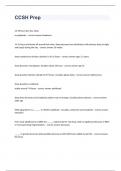
-
CCSH Prep question n answers graded A+ 2023/2024
- Exam (elaborations) • 36 pages • 2024
- Available in package deal
-
- $17.99
- + learn more
CCSH Prep16-18 hours per day; sleep is polyphasic. - correct answer Newborns 14-15 hours and levels off around that value. Sleep becomes less distributed, with primary sleep at night and nap(s) during the day. - correct answer 16 weeks sleep continues to decline; duration is 10-12 hours - correct answer ages 2-5 years sleep becomes monophasic; duration about 10 hours - correct answer age 10 sleep duration declines sharply to 8-9 hours; circadian phase delay - correct answer adolesce...
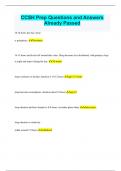
-
CCSH Prep Questions and Answers Already Passed
- Exam (elaborations) • 58 pages • 2024
-
- $11.99
- + learn more
CCSH Prep Questions and Answers Already Passed 16-18 hours per day; sleep is polyphasic. Newborns 14-15 hours and levels off around that value. Sleep becomes less distributed, with primary sleep at night and nap(s) during the day. 16 weeks sleep continues to decline; duration is 10-12 hours ages 2-5 years sleep becomes monophasic; duration about 10 hours age 10 sleep duration declines sharply to 8-9 hours; circadian phase delay adolescence, sleep duration is relatively st...
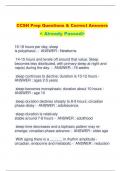
-
CCSH Prep Questions & Correct Answers < Already Passed>
- Exam (elaborations) • 39 pages • 2024
-
- $11.34
- + learn more
CCSH Prep Questions & Correct Answers < Already Passed> 16-18 hours per day; sleep is polyphasic. - ANSWER : Newborns 14-15 hours and levels off around that value. Sleep becomes less distributed, with primary sleep at night and nap(s) during the day. - ANSWER : 16 weeks sleep continues to decline; duration is 10-12 hours - ANSWER : ages 2-5 years sleep becomes monophasic; duration about 10 hours - ANSWER : age 10 sleep duration declines sharply to 8-9 hours; circadian pha...
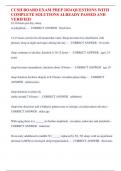
-
CCSH BOARD EXAM PREP 2024 QUESTIONS WITH COMPLETE SOLUTIONS ALREADY PASSED AND VERIFIED
- Exam (elaborations) • 44 pages • 2024
- Available in package deal
-
- $15.49
- + learn more
16-18 hours per day; sleep is polyphasic. - CORRECT ANSWER Newborns 14-15 hours and levels off around that value. Sleep becomes less distributed, with primary sleep at night and nap(s) during the day. - CORRECT ANSWER 16 weeks sleep continues to decline; duration is 10-12 hours - CORRECT ANSWER ages 2-5 years sleep becomes monophasic; duration about 10 hours - CORRECT ANSWER age 10 sleep duration declines sharply to 8-9 hours; circadian phase delay - C...
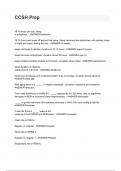
-
CCSH Prep questions and answers
- Exam (elaborations) • 24 pages • 2024
- Available in package deal
-
- $7.99
- + learn more
CCSH Prep 16-18 hours per day; sleep is polyphasic. - ANSWER-Newborns 14-15 hours and levels off around that value. Sleep becomes less distributed, with primary sleep at night and nap(s) during the day. - ANSWER-16 weeks sleep continues to decline; duration is 10-12 hours - ANSWER-ages 2-5 years sleep becomes monophasic; duration about 10 hours - ANSWER-age 10 sleep duration declines sharply to 8-9 hours; circadian phase delay - ANSWER-adolescence, sleep duration is relatively stable ar...
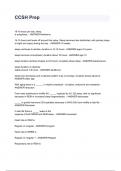
-
CCSH Prep questions and answers
- Exam (elaborations) • 24 pages • 2024
- Available in package deal
-
- $7.99
- + learn more
16-18 hours per day; sleep is polyphasic. - ANSWER-Newborns 14-15 hours and levels off around that value. Sleep becomes less distributed, with primary sleep at night and nap(s) during the day. - ANSWER-16 weeks sleep continues to decline; duration is 10-12 hours - ANSWER-ages 2-5 years sleep becomes monophasic; duration about 10 hours - ANSWER-age 10 sleep duration declines sharply to 8-9 hours; circadian phase delay - ANSWER-adolescence, sleep duration is relatively stable around 7-8 ho...

$6.50 for your textbook summary multiplied by 100 fellow students... Do the math: that's a lot of money! Don't be a thief of your own wallet and start uploading yours now. Discover all about earning on Stuvia

